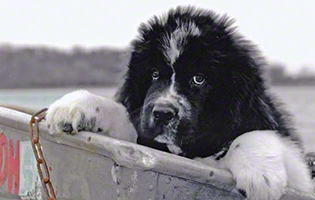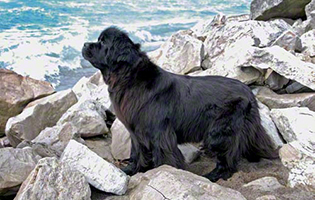Canine nutrition is an area of growing concern for dog owners in general and giant breed owners in particular. Giants breed puppies will experience a similar rate of growth in a single year to what humans experience over 20 years. Even a short time spent eating an unbalanced diet can have implications for long term growth and development.
"In order to live, a dog must eat. How long the dog lives, as well as health, immune system, behavior and temperament, the ability to reproduce successfully and to recover from trauma, all depend on what is eaten." - Wendy Volhard
There are 6 Building Bloacks which make up the nutritional needs of dogs:
Proteins: Protein is essential for growth of healthy tissue. Proteins also help repair damaged cells, and are important components in the production of antibodies, which ward off infection. The millions of chemical reactions that occur in a dog's body are regulated by hormones and enzymes, both of which depend upon a constant supply of fresh protein.
Carbohydrates: Dogs, like people, rely on carbohydrates for energy. Glucose, the simple sugar that fuels the body, is a byproduct of carbohydrate metabolism. If a dog is not receiving an adequate supply of carbohydrates, he will turn to his protein resevre for fuel - protein intended for cell maintenance and growth.
Fats: Fats provide significantly more energy that proteins or carbohydrtes. They carry fat soluble vitamins A, D, E and K through the body, and they add a luminous sheen to a dogs coat. They also assist in many different metabolic reaction.
Vitamins: Vitamins serve to insure proper metabolism and many body functions. It is easy to fall into the trap of thinking that supplmenting vitamins for a growing pup is a necessary thing to do, but too much of a good thing can be just as harmful as not enough. Check with your veterinarian and breeder before adding any vitamin supplements to your Newfoundland's diet.
Minerals: Minerals are crucial for many different physiological processes and proper bone growth. For dogs, two of the most essential minerals are calcium and phosphorus, which play significant roles in the formation of a healthy skeletal system. The proportions of these minerals within the overall diet should be monitored and kept in balance - including treats and recreational chews.
Water: Water is essential to life; every living cell requires a constant supply of this crucial substance. Every dog requires access to clean, fresh water every day. To calculate your dogs water requirements multiply his weight in pounds by .65. This product represents the number of fluid ounces of water your dog requires each day. Remember that exercise, heat and stress will increase this amount.
According to Susan Wynn, DVM in the Journal of Integrative Veterinary Care, here are some dietary recommendations for large and giant breed puppies:
• Make sure the diet is complete and balanced "for all life stages" according to AAFCO Guidelines, or if home-prepared, has been analyzed by a veterinary nutritionist.
• Never free feed
• Keep the puppy lean (4/9 or 5/9 on the Body Condition Score system)
• Look for these guidelines: Dry matter content of about 30% protein, 9% fat, 1.5% calcium and 0.8% to 1% phosphorus. The calcium:phosphorus ratio should be between 1:1 to 1.3:1

